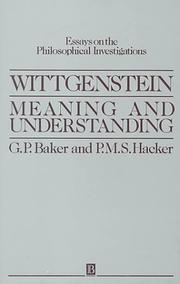| Listing 1 - 10 of 720 | << page >> |
Sort by
|
Book
ISBN: 2711682447 9782711682447 Year: 1982 Volume: 2 2 Publisher: Grenoble: Université des sciences sociales de Grenoble,
Abstract | Keywords | Export | Availability | Bookmark
 Loading...
Loading...Choose an application
- Reference Manager
- EndNote
- RefWorks (Direct export to RefWorks)
Book
ISBN: 0674170253 9780674170254 Year: 1977 Publisher: Cambridge (Mass.) : Harvard university press,
Abstract | Keywords | Export | Availability | Bookmark
 Loading...
Loading...Choose an application
- Reference Manager
- EndNote
- RefWorks (Direct export to RefWorks)
Book
ISBN: 2905372621 9782905372628 Year: 1992 Publisher: Combas: Éditions de l'éclat,
Abstract | Keywords | Export | Availability | Bookmark
 Loading...
Loading...Choose an application
- Reference Manager
- EndNote
- RefWorks (Direct export to RefWorks)
Book
Year: 2001 Publisher: Cambridge ; New York, NY : Cambridge University Press,
Abstract | Keywords | Export | Availability | Bookmark
 Loading...
Loading...Choose an application
- Reference Manager
- EndNote
- RefWorks (Direct export to RefWorks)
Book
ISBN: 0816608660 Year: 1981 Publisher: Minneapolis, Minn.
Abstract | Keywords | Export | Availability | Bookmark
 Loading...
Loading...Choose an application
- Reference Manager
- EndNote
- RefWorks (Direct export to RefWorks)

ISBN: 0631130713 Year: 1983 Publisher: Oxford : Blackwell,
Abstract | Keywords | Export | Availability | Bookmark
 Loading...
Loading...Choose an application
- Reference Manager
- EndNote
- RefWorks (Direct export to RefWorks)
Book
ISBN: 178735251X 1787352528 Year: 2019 Publisher: London UCL Press
Abstract | Keywords | Export | Availability | Bookmark
 Loading...
Loading...Choose an application
- Reference Manager
- EndNote
- RefWorks (Direct export to RefWorks)
In the past decades, translation studies have increasingly focused on the ethical dimension of translational activity, with an emphasis on reflexivity to assert the role of the researcher in highlighting issues of visibility, creativity and ethics. In Reflexive Translation Studies, Silvia Kadiu investigates the viability of theories that seek to empower translation by making visible its transformative dimension; for example, by championing the visibility of the translating subject, the translator’s right to creativity, the supremacy of human translation or an autonomous study of translation.Inspired by Derrida’s deconstructive thinking, Kadiu presents practical ways of challenging theories that argue reflexivity is the only way of developing an ethical translation. She questions the capacity of reflexivity to counteract the power relations at play in translation (between minor and dominant languages, for example) and problematises affirmative claims about (self-)knowledge by using translation itself as a process of critical reflection.
Book
ISBN: 9781009082853 1009085824 100908285X 1009085301 9781316514252 9781009077996 1316514250 9781009085304 9781009085823 Year: 2024 Publisher: Cambridge ; New York, NY : Cambridge University Press,
Abstract | Keywords | Export | Availability | Bookmark
 Loading...
Loading...Choose an application
- Reference Manager
- EndNote
- RefWorks (Direct export to RefWorks)
What is the remit of theoretical linguistics? How are human languages different from animal calls or artificial languages? What philosophical insights about language can be gleaned from phonology, pragmatics, probabilistic linguistics, and deep learning? This book addresses the current philosophical issues at the heart of theoretical linguistics, which are widely debated not only by linguists, but also philosophers, psychologists, and computer scientists. It delves into hitherto uncharted territory, putting philosophy in direct conversation with phonology, sign language studies, supersemantics, computational linguistics, and language evolution. A range of theoretical positions are covered, from optimality theory and autosegmental phonology to generative syntax, dynamic semantics, and natural language processing with deep learning techniques. By both unwinding the complexities of natural language and delving into the nature of the science that studies it, this book ultimately improves our tools of discovery aimed at one of the most essential features of our humanity, our language.
Book
Year: 2019 Publisher: University College London
Abstract | Keywords | Export | Availability | Bookmark
 Loading...
Loading...Choose an application
- Reference Manager
- EndNote
- RefWorks (Direct export to RefWorks)
The Origins of Self explores the role that selfhood plays in defining human society, and each human individual in that society. It considers the genetic and cultural origins of self, the role that self plays in socialisation and language, and the types of self we generate in our individual journeys to and through adulthood.Edwardes argues that other awareness is a relatively early evolutionary development, present throughout the primate clade and perhaps beyond, but self-awareness is a product of the sharing of social models, something only humans appear to do. The self of which we are aware is not something innate within us, it is a model of our self produced as a response to the models of us offered to us by other people. Edwardes proposes that human construction of selfhood involves seven different types of self. All but one of them are internally generated models, and the only non-model, the actual self, is completely hidden from conscious awareness. We rely on others to tell us about our self, and even to let us know we are a self.
PSYCHOLOGY --- Philosophy of language --- General.
Book
ISBN: 3884050532 9783884050538 Year: 1988 Publisher: München Philosophia
Abstract | Keywords | Export | Availability | Bookmark
 Loading...
Loading...Choose an application
- Reference Manager
- EndNote
- RefWorks (Direct export to RefWorks)
Logic --- Philosophy of language --- Metaphysics --- Métaphysique
| Listing 1 - 10 of 720 | << page >> |
Sort by
|

 Search
Search Feedback
Feedback About UniCat
About UniCat  Help
Help News
News